Restaurant Manager Resume Examples & Writing Tips for 2025

Jul 18, 2024
|
12 min read
Need the recipe for success? Check out our restaurant manager resume guide now.
Rated by 348 people
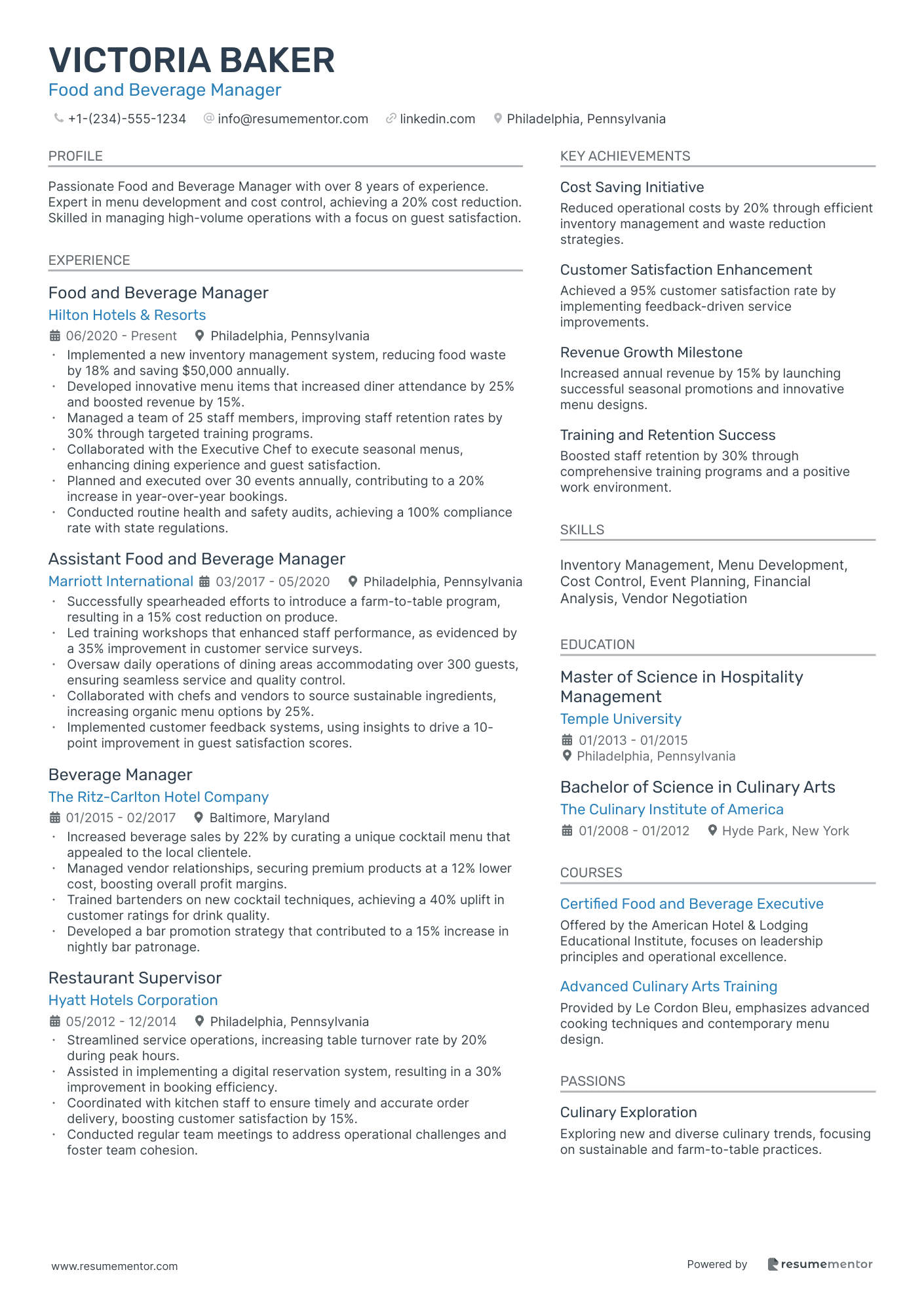
Food and Beverage Manager
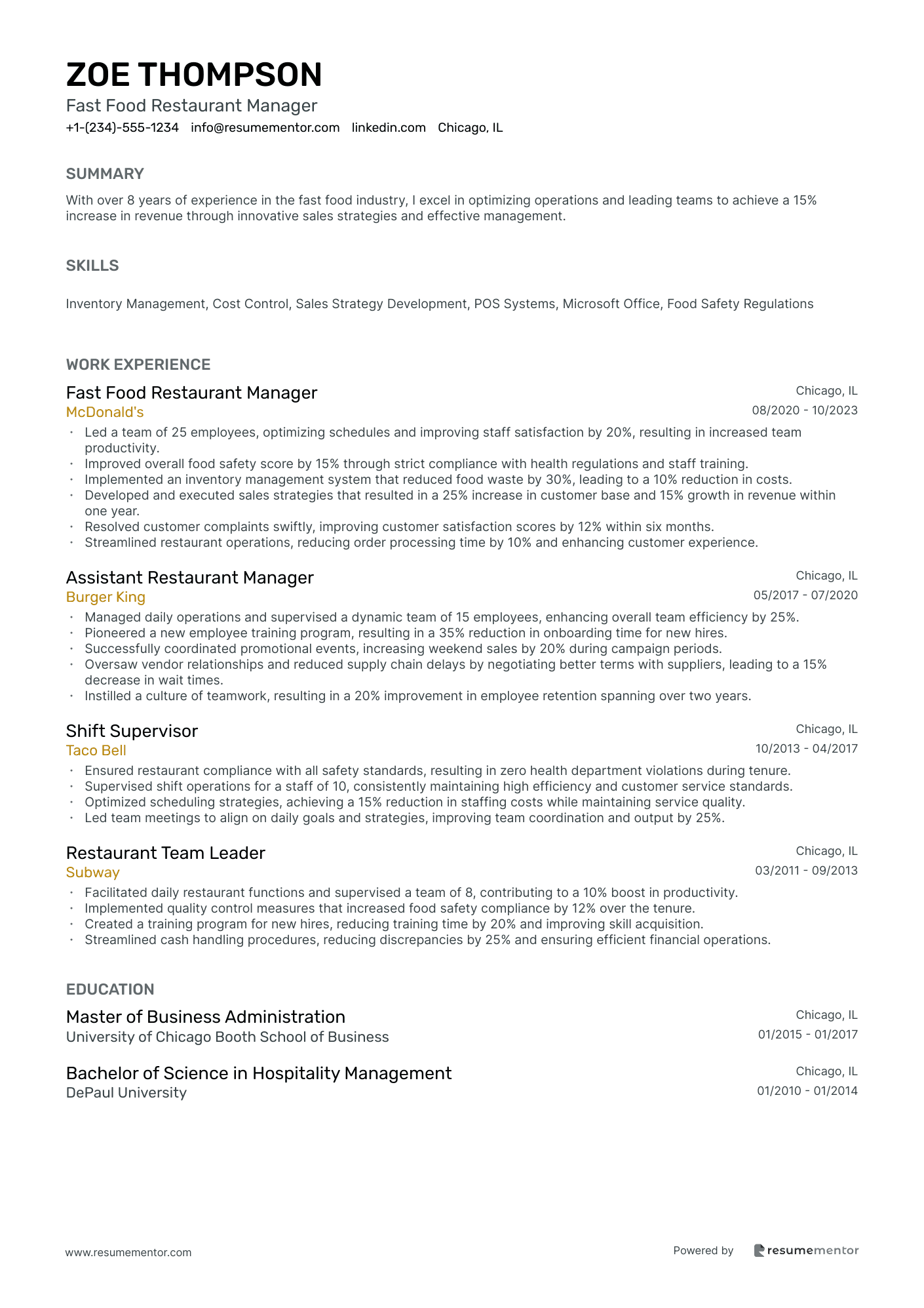
Fast Food Restaurant Manager
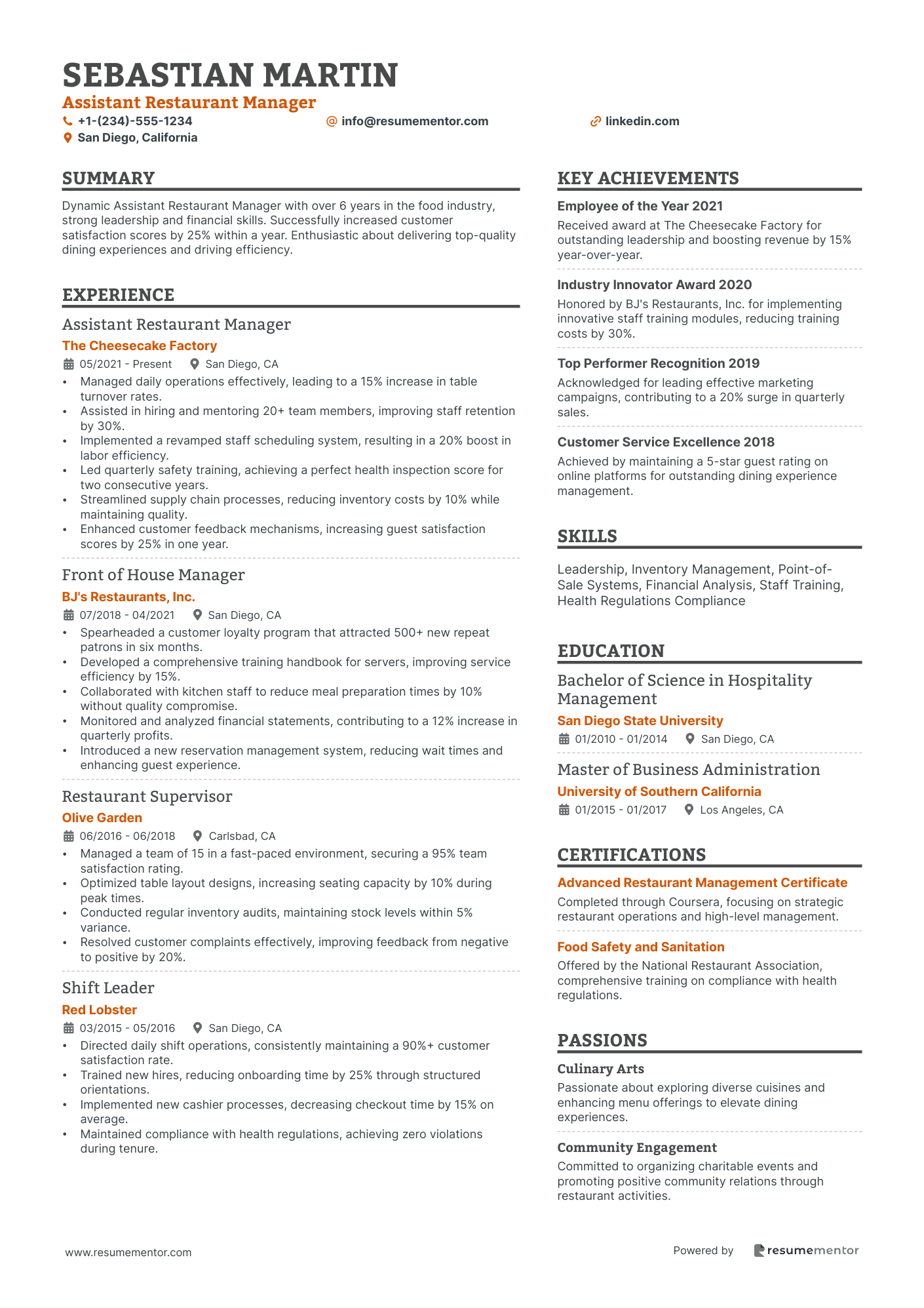
Assistant Restaurant Manager
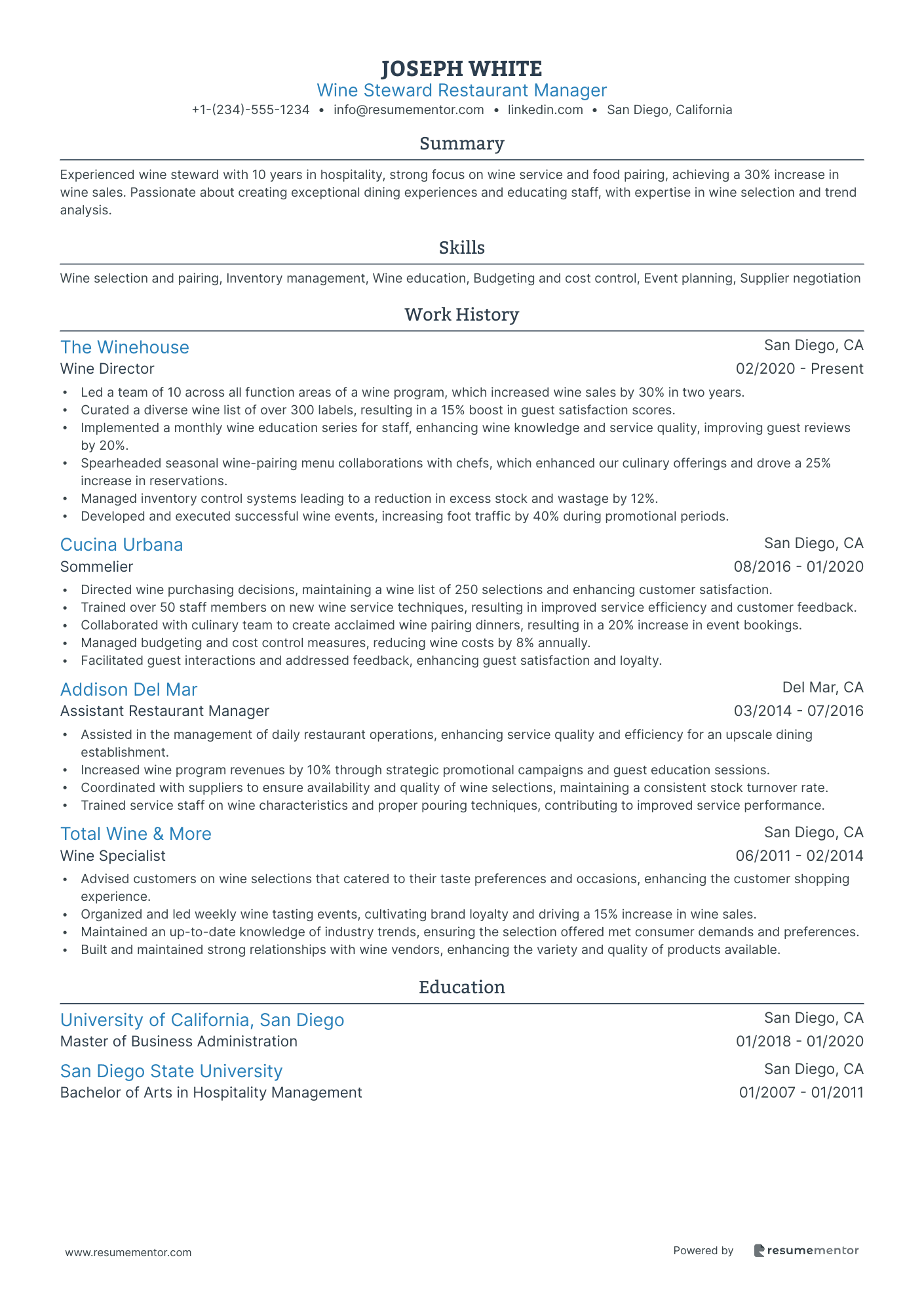
Wine Steward Restaurant Manager
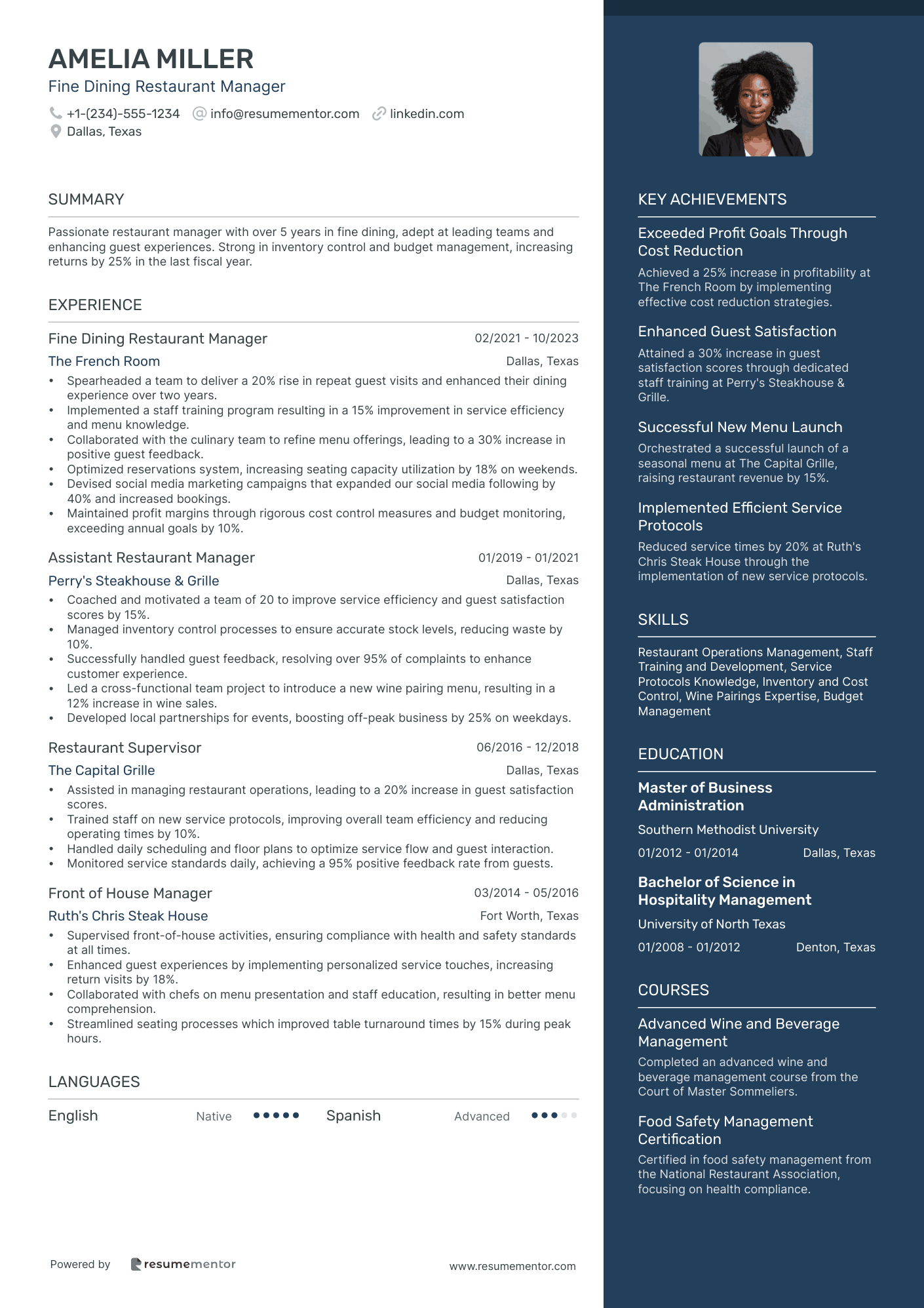
Fine Dining Restaurant Manager
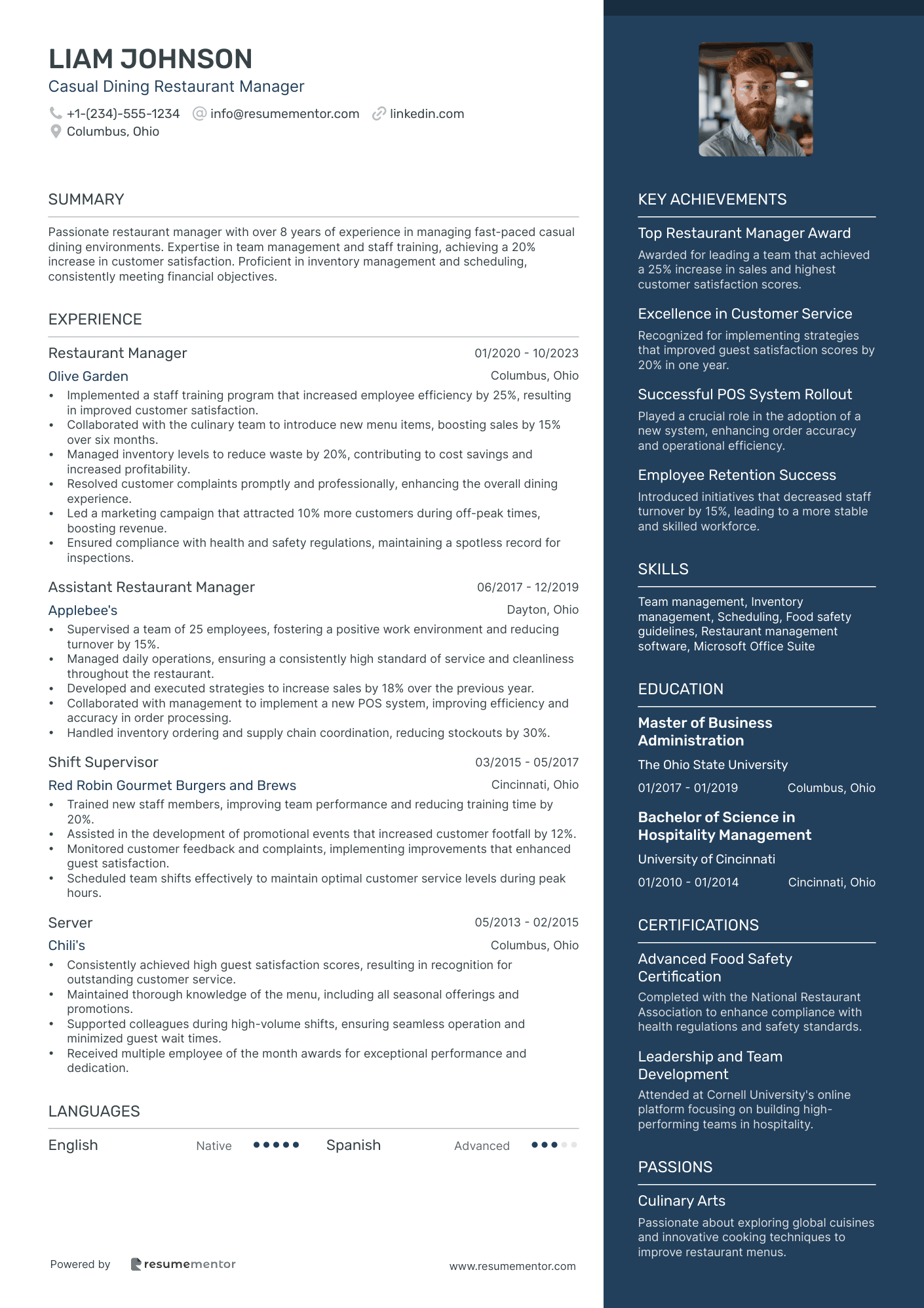
Casual Dining Restaurant Manager
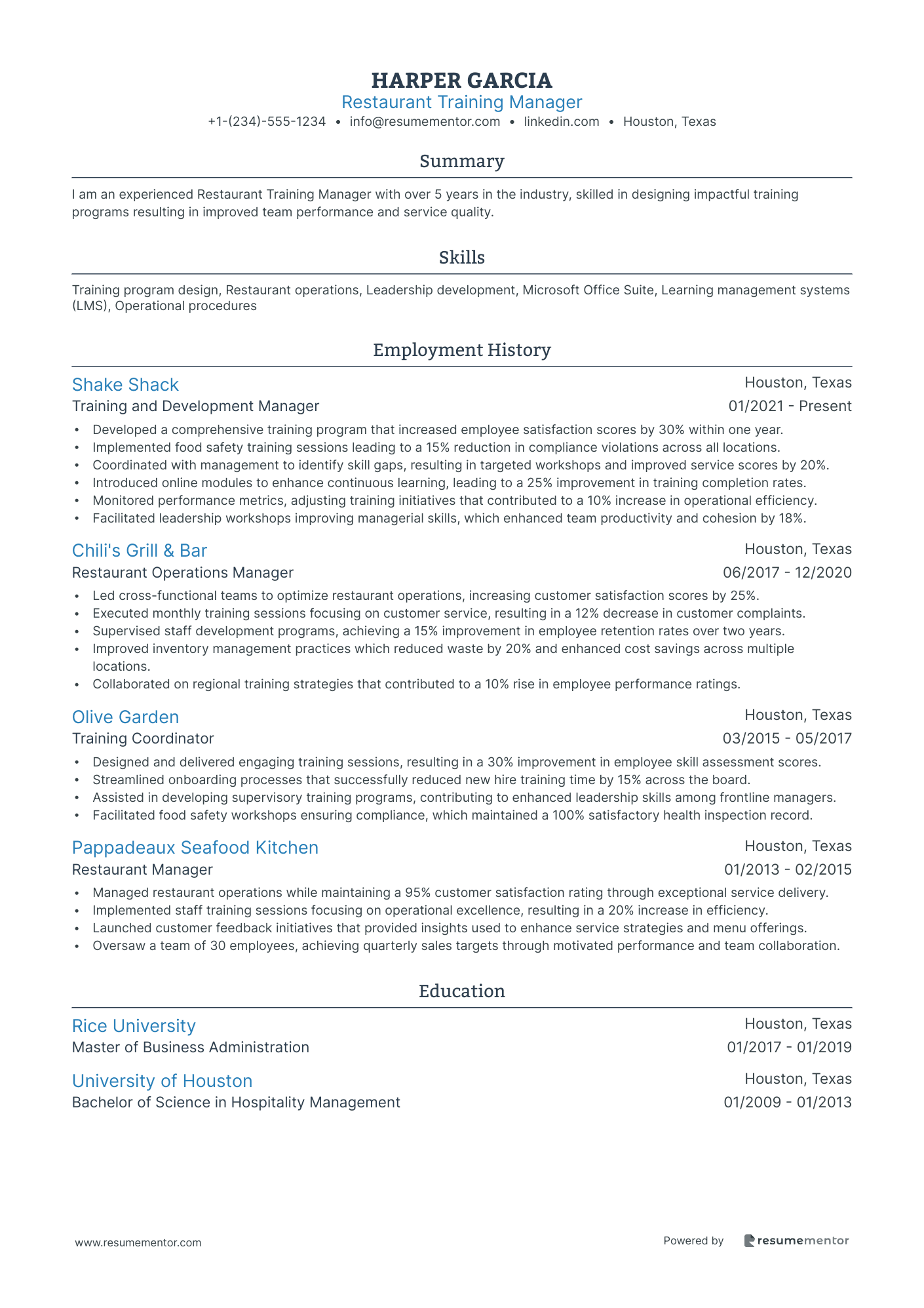
Restaurant Training Manager
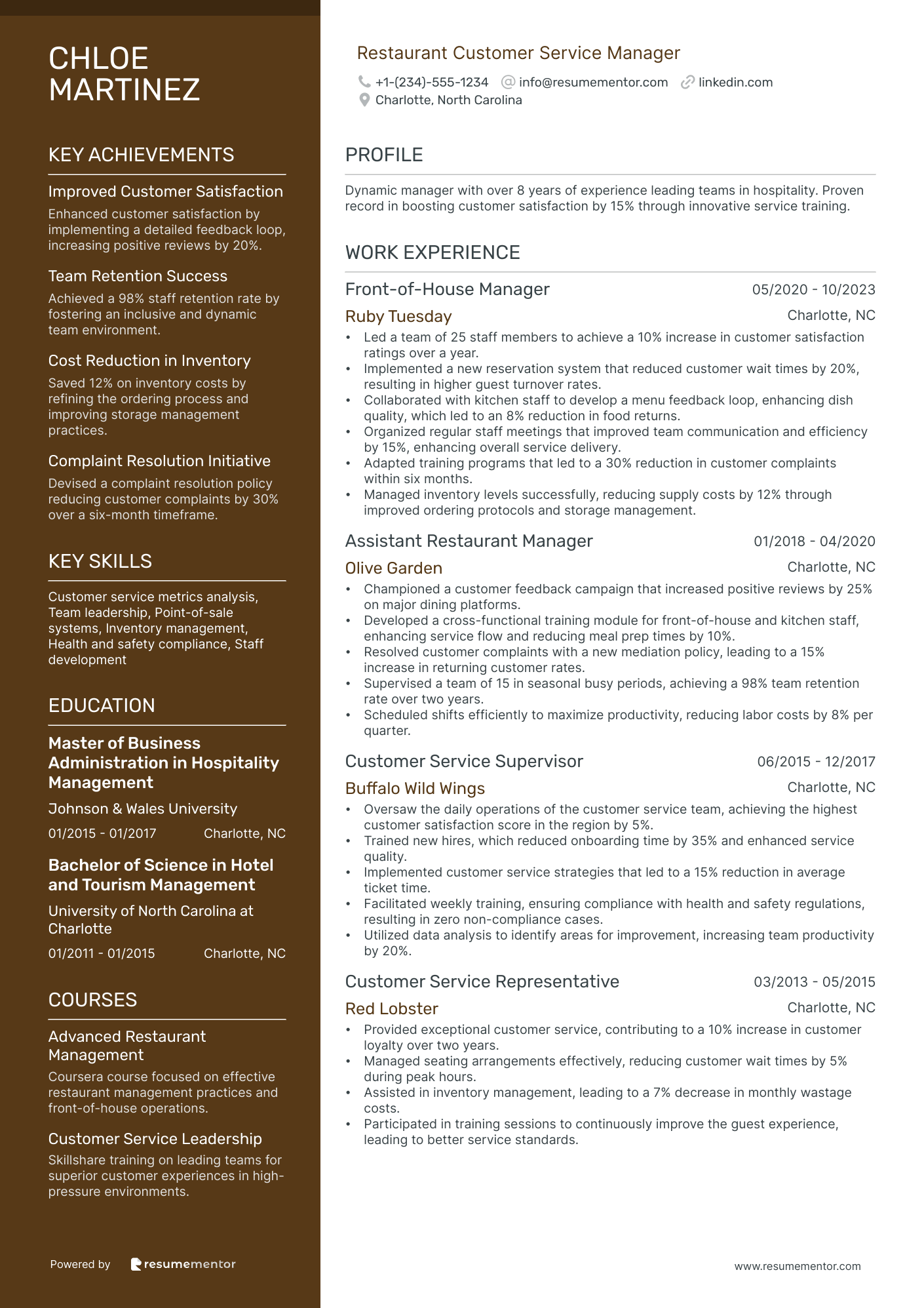
Restaurant Customer Service Manager

Food and Beverage Manager resume sample
- •Implemented a new inventory management system, reducing food waste by 18% and saving $50,000 annually.
- •Developed innovative menu items that increased diner attendance by 25% and boosted revenue by 15%.
- •Managed a team of 25 staff members, improving staff retention rates by 30% through targeted training programs.
- •Collaborated with the Executive Chef to execute seasonal menus, enhancing dining experience and guest satisfaction.
- •Planned and executed over 30 events annually, contributing to a 20% increase in year-over-year bookings.
- •Conducted routine health and safety audits, achieving a 100% compliance rate with state regulations.
- •Successfully spearheaded efforts to introduce a farm-to-table program, resulting in a 15% cost reduction on produce.
- •Led training workshops that enhanced staff performance, as evidenced by a 35% improvement in customer service surveys.
- •Oversaw daily operations of dining areas accommodating over 300 guests, ensuring seamless service and quality control.
- •Collaborated with chefs and vendors to source sustainable ingredients, increasing organic menu options by 25%.
- •Implemented customer feedback systems, using insights to drive a 10-point improvement in guest satisfaction scores.
- •Increased beverage sales by 22% by curating a unique cocktail menu that appealed to the local clientele.
- •Managed vendor relationships, securing premium products at a 12% lower cost, boosting overall profit margins.
- •Trained bartenders on new cocktail techniques, achieving a 40% uplift in customer ratings for drink quality.
- •Developed a bar promotion strategy that contributed to a 15% increase in nightly bar patronage.
- •Streamlined service operations, increasing table turnover rate by 20% during peak hours.
- •Assisted in implementing a digital reservation system, resulting in a 30% improvement in booking efficiency.
- •Coordinated with kitchen staff to ensure timely and accurate order delivery, boosting customer satisfaction by 15%.
- •Conducted regular team meetings to address operational challenges and foster team cohesion.
Fast Food Restaurant Manager resume sample
- •Led a team of 25 employees, optimizing schedules and improving staff satisfaction by 20%, resulting in increased team productivity.
- •Improved overall food safety score by 15% through strict compliance with health regulations and staff training.
- •Implemented an inventory management system that reduced food waste by 30%, leading to a 10% reduction in costs.
- •Developed and executed sales strategies that resulted in a 25% increase in customer base and 15% growth in revenue within one year.
- •Resolved customer complaints swiftly, improving customer satisfaction scores by 12% within six months.
- •Streamlined restaurant operations, reducing order processing time by 10% and enhancing customer experience.
- •Managed daily operations and supervised a dynamic team of 15 employees, enhancing overall team efficiency by 25%.
- •Pioneered a new employee training program, resulting in a 35% reduction in onboarding time for new hires.
- •Successfully coordinated promotional events, increasing weekend sales by 20% during campaign periods.
- •Oversaw vendor relationships and reduced supply chain delays by negotiating better terms with suppliers, leading to a 15% decrease in wait times.
- •Instilled a culture of teamwork, resulting in a 20% improvement in employee retention spanning over two years.
- •Ensured restaurant compliance with all safety standards, resulting in zero health department violations during tenure.
- •Supervised shift operations for a staff of 10, consistently maintaining high efficiency and customer service standards.
- •Optimized scheduling strategies, achieving a 15% reduction in staffing costs while maintaining service quality.
- •Led team meetings to align on daily goals and strategies, improving team coordination and output by 25%.
- •Facilitated daily restaurant functions and supervised a team of 8, contributing to a 10% boost in productivity.
- •Implemented quality control measures that increased food safety compliance by 12% over the tenure.
- •Created a training program for new hires, reducing training time by 20% and improving skill acquisition.
- •Streamlined cash handling procedures, reducing discrepancies by 25% and ensuring efficient financial operations.
Assistant Restaurant Manager resume sample
- •Managed daily operations effectively, leading to a 15% increase in table turnover rates.
- •Assisted in hiring and mentoring 20+ team members, improving staff retention by 30%.
- •Implemented a revamped staff scheduling system, resulting in a 20% boost in labor efficiency.
- •Led quarterly safety training, achieving a perfect health inspection score for two consecutive years.
- •Streamlined supply chain processes, reducing inventory costs by 10% while maintaining quality.
- •Enhanced customer feedback mechanisms, increasing guest satisfaction scores by 25% in one year.
- •Spearheaded a customer loyalty program that attracted 500+ new repeat patrons in six months.
- •Developed a comprehensive training handbook for servers, improving service efficiency by 15%.
- •Collaborated with kitchen staff to reduce meal preparation times by 10% without quality compromise.
- •Monitored and analyzed financial statements, contributing to a 12% increase in quarterly profits.
- •Introduced a new reservation management system, reducing wait times and enhancing guest experience.
- •Managed a team of 15 in a fast-paced environment, securing a 95% team satisfaction rating.
- •Optimized table layout designs, increasing seating capacity by 10% during peak times.
- •Conducted regular inventory audits, maintaining stock levels within 5% variance.
- •Resolved customer complaints effectively, improving feedback from negative to positive by 20%.
- •Directed daily shift operations, consistently maintaining a 90%+ customer satisfaction rate.
- •Trained new hires, reducing onboarding time by 25% through structured orientations.
- •Implemented new cashier processes, decreasing checkout time by 15% on average.
- •Maintained compliance with health regulations, achieving zero violations during tenure.
Wine Steward Restaurant Manager resume sample
- •Led a team of 10 across all function areas of a wine program, which increased wine sales by 30% in two years.
- •Curated a diverse wine list of over 300 labels, resulting in a 15% boost in guest satisfaction scores.
- •Implemented a monthly wine education series for staff, enhancing wine knowledge and service quality, improving guest reviews by 20%.
- •Spearheaded seasonal wine-pairing menu collaborations with chefs, which enhanced our culinary offerings and drove a 25% increase in reservations.
- •Managed inventory control systems leading to a reduction in excess stock and wastage by 12%.
- •Developed and executed successful wine events, increasing foot traffic by 40% during promotional periods.
- •Directed wine purchasing decisions, maintaining a wine list of 250 selections and enhancing customer satisfaction.
- •Trained over 50 staff members on new wine service techniques, resulting in improved service efficiency and customer feedback.
- •Collaborated with culinary team to create acclaimed wine pairing dinners, resulting in a 20% increase in event bookings.
- •Managed budgeting and cost control measures, reducing wine costs by 8% annually.
- •Facilitated guest interactions and addressed feedback, enhancing guest satisfaction and loyalty.
- •Assisted in the management of daily restaurant operations, enhancing service quality and efficiency for an upscale dining establishment.
- •Increased wine program revenues by 10% through strategic promotional campaigns and guest education sessions.
- •Coordinated with suppliers to ensure availability and quality of wine selections, maintaining a consistent stock turnover rate.
- •Trained service staff on wine characteristics and proper pouring techniques, contributing to improved service performance.
- •Advised customers on wine selections that catered to their taste preferences and occasions, enhancing the customer shopping experience.
- •Organized and led weekly wine tasting events, cultivating brand loyalty and driving a 15% increase in wine sales.
- •Maintained an up-to-date knowledge of industry trends, ensuring the selection offered met consumer demands and preferences.
- •Built and maintained strong relationships with wine vendors, enhancing the variety and quality of products available.
Fine Dining Restaurant Manager resume sample
- •Spearheaded a team to deliver a 20% rise in repeat guest visits and enhanced their dining experience over two years.
- •Implemented a staff training program resulting in a 15% improvement in service efficiency and menu knowledge.
- •Collaborated with the culinary team to refine menu offerings, leading to a 30% increase in positive guest feedback.
- •Optimized reservations system, increasing seating capacity utilization by 18% on weekends.
- •Devised social media marketing campaigns that expanded our social media following by 40% and increased bookings.
- •Maintained profit margins through rigorous cost control measures and budget monitoring, exceeding annual goals by 10%.
- •Coached and motivated a team of 20 to improve service efficiency and guest satisfaction scores by 15%.
- •Managed inventory control processes to ensure accurate stock levels, reducing waste by 10%.
- •Successfully handled guest feedback, resolving over 95% of complaints to enhance customer experience.
- •Led a cross-functional team project to introduce a new wine pairing menu, resulting in a 12% increase in wine sales.
- •Developed local partnerships for events, boosting off-peak business by 25% on weekdays.
- •Assisted in managing restaurant operations, leading to a 20% increase in guest satisfaction scores.
- •Trained staff on new service protocols, improving overall team efficiency and reducing operating times by 10%.
- •Handled daily scheduling and floor plans to optimize service flow and guest interaction.
- •Monitored service standards daily, achieving a 95% positive feedback rate from guests.
- •Supervised front-of-house activities, ensuring compliance with health and safety standards at all times.
- •Enhanced guest experiences by implementing personalized service touches, increasing return visits by 18%.
- •Collaborated with chefs on menu presentation and staff education, resulting in better menu comprehension.
- •Streamlined seating processes which improved table turnaround times by 15% during peak hours.
Casual Dining Restaurant Manager resume sample
- •Implemented a staff training program that increased employee efficiency by 25%, resulting in improved customer satisfaction.
- •Collaborated with the culinary team to introduce new menu items, boosting sales by 15% over six months.
- •Managed inventory levels to reduce waste by 20%, contributing to cost savings and increased profitability.
- •Resolved customer complaints promptly and professionally, enhancing the overall dining experience.
- •Led a marketing campaign that attracted 10% more customers during off-peak times, boosting revenue.
- •Ensured compliance with health and safety regulations, maintaining a spotless record for inspections.
- •Supervised a team of 25 employees, fostering a positive work environment and reducing turnover by 15%.
- •Managed daily operations, ensuring a consistently high standard of service and cleanliness throughout the restaurant.
- •Developed and executed strategies to increase sales by 18% over the previous year.
- •Collaborated with management to implement a new POS system, improving efficiency and accuracy in order processing.
- •Handled inventory ordering and supply chain coordination, reducing stockouts by 30%.
- •Trained new staff members, improving team performance and reducing training time by 20%.
- •Assisted in the development of promotional events that increased customer footfall by 12%.
- •Monitored customer feedback and complaints, implementing improvements that enhanced guest satisfaction.
- •Scheduled team shifts effectively to maintain optimal customer service levels during peak hours.
- •Consistently achieved high guest satisfaction scores, resulting in recognition for outstanding customer service.
- •Maintained thorough knowledge of the menu, including all seasonal offerings and promotions.
- •Supported colleagues during high-volume shifts, ensuring seamless operation and minimized guest wait times.
- •Received multiple employee of the month awards for exceptional performance and dedication.
Restaurant Training Manager resume sample
- •Developed a comprehensive training program that increased employee satisfaction scores by 30% within one year.
- •Implemented food safety training sessions leading to a 15% reduction in compliance violations across all locations.
- •Coordinated with management to identify skill gaps, resulting in targeted workshops and improved service scores by 20%.
- •Introduced online modules to enhance continuous learning, leading to a 25% improvement in training completion rates.
- •Monitored performance metrics, adjusting training initiatives that contributed to a 10% increase in operational efficiency.
- •Facilitated leadership workshops improving managerial skills, which enhanced team productivity and cohesion by 18%.
- •Led cross-functional teams to optimize restaurant operations, increasing customer satisfaction scores by 25%.
- •Executed monthly training sessions focusing on customer service, resulting in a 12% decrease in customer complaints.
- •Supervised staff development programs, achieving a 15% improvement in employee retention rates over two years.
- •Improved inventory management practices which reduced waste by 20% and enhanced cost savings across multiple locations.
- •Collaborated on regional training strategies that contributed to a 10% rise in employee performance ratings.
- •Designed and delivered engaging training sessions, resulting in a 30% improvement in employee skill assessment scores.
- •Streamlined onboarding processes that successfully reduced new hire training time by 15% across the board.
- •Assisted in developing supervisory training programs, contributing to enhanced leadership skills among frontline managers.
- •Facilitated food safety workshops ensuring compliance, which maintained a 100% satisfactory health inspection record.
- •Managed restaurant operations while maintaining a 95% customer satisfaction rating through exceptional service delivery.
- •Implemented staff training sessions focusing on operational excellence, resulting in a 20% increase in efficiency.
- •Launched customer feedback initiatives that provided insights used to enhance service strategies and menu offerings.
- •Oversaw a team of 30 employees, achieving quarterly sales targets through motivated performance and team collaboration.
Restaurant Customer Service Manager resume sample
- •Led a team of 25 staff members to achieve a 10% increase in customer satisfaction ratings over a year.
- •Implemented a new reservation system that reduced customer wait times by 20%, resulting in higher guest turnover rates.
- •Collaborated with kitchen staff to develop a menu feedback loop, enhancing dish quality, which led to an 8% reduction in food returns.
- •Organized regular staff meetings that improved team communication and efficiency by 15%, enhancing overall service delivery.
- •Adapted training programs that led to a 30% reduction in customer complaints within six months.
- •Managed inventory levels successfully, reducing supply costs by 12% through improved ordering protocols and storage management.
- •Championed a customer feedback campaign that increased positive reviews by 25% on major dining platforms.
- •Developed a cross-functional training module for front-of-house and kitchen staff, enhancing service flow and reducing meal prep times by 10%.
- •Resolved customer complaints with a new mediation policy, leading to a 15% increase in returning customer rates.
- •Supervised a team of 15 in seasonal busy periods, achieving a 98% team retention rate over two years.
- •Scheduled shifts efficiently to maximize productivity, reducing labor costs by 8% per quarter.
- •Oversaw the daily operations of the customer service team, achieving the highest customer satisfaction score in the region by 5%.
- •Trained new hires, which reduced onboarding time by 35% and enhanced service quality.
- •Implemented customer service strategies that led to a 15% reduction in average ticket time.
- •Facilitated weekly training, ensuring compliance with health and safety regulations, resulting in zero non-compliance cases.
- •Utilized data analysis to identify areas for improvement, increasing team productivity by 20%.
- •Provided exceptional customer service, contributing to a 10% increase in customer loyalty over two years.
- •Managed seating arrangements effectively, reducing customer wait times by 5% during peak hours.
- •Assisted in inventory management, leading to a 7% decrease in monthly wastage costs.
- •Participated in training sessions to continuously improve the guest experience, leading to better service standards.
Writing a resume for a restaurant manager job can feel like balancing a tray of drinks during a lunch rush. You’re a pro when it comes to managing a busy eatery, but can you show that off on your resume and back it up with stats and facts?
Hiring managers are looking for leaders, not just operation experts. However, balancing your hands-on experience and your leadership know-how on paper can be tough. It’s your job to show that you’re a good all-rounder, keeping the plates spinning fast.
In this guide, we’ll show you how to write a compelling restaurant manager resume that ticks all the boxes. Read on to find out how you can cook up a storm.
Key takeaways
- Focus on demonstrating your impact with concrete figures like sales growth, cost reductions, or team performance. Example: "Increased quarterly sales by 20% through improved customer engagement."
- Showcase how you've led and developed teams, handled customer service, and fostered a positive workplace culture. Include leadership certifications like Certified Restaurant Manager (CRM) or ServSafe Manager to validate your skills.
- Use a clear, skimmable format with short, impactful sentences and bullet points. Focus on what adds value and avoid unnecessary details to ensure the resume is easy to read.
- Demonstrate how you’ve initiated changes to improve the business, such as reducing food waste, improving operational processes, or attracting new customers. Prove that you’re always seeking ways to innovate.
- Customize your resume for each position, ensuring your skills, experience, and qualifications match the job description and requirements.
How to use this restaurant manager resume guide
We’ve created this restaurant manager guide to help you with the trickier side of applying for jobs. We understand that it’s not always easy—that’s why we’re here to help.
Luckily for you, we’ve got a bunch of tools, tips, and examples to help you stand out in the competitive job market. Ready to get started? Follow the steps below to make the most of this resource. Use our resume builder for a polished and professional finish.
- Begin with the introduction to understand the basics of effective resume building in the hospitality sector.
- Review the key takeaways for quick insights on what makes a restaurant management resume stand out.
- Follow the section-by-section layout to structure your resume efficiently, focusing on skills, experience, and achievements relevant to restaurant management.
- Utilize our specialized resume builder designed for hospitality professionals.
- Learn from real-world examples of successful restaurant managers to see effective resume strategies in action.
- Focus on tips and highlights that are particularly beneficial for enhancing a restaurant manager’s resume.
- Tailor your resume to emphasize your ability to manage restaurant operations, staff, and customer service for maximum impact.
- Refer to trusted resources that offer advice and examples specific to the restaurant industry.
- Apply what you’ve learned to create a compelling resume that showcases your management skills.
- Save and regularly update your progress to keep your resume current with your latest experiences and accomplishments in restaurant management.
Armed with our resume builder and this guide, you have everything you need to land your next restaurant manager job.
Ready to get cooking? Let’s take a look at the first step in the process.
What to focus on when writing your restaurant manager resume
When you’re writing your restaurant manager resume, you need to focus on your key skills, measurable achievements, and industry-specific expertise. Try to quantify these feats with metrics to show the hiring manager what value you bring to the table.
It’s important to grab the reader's attention quickly. So, make sure your resume layout is simple, skimmable, and attractive. Having an eye-catching resume is half of the job.
Is your resume good enough?
Drop your resume here or choose a file.
PDF & DOCX only. Max 2MB file size.
The impact you made on sales
Money talks—literally. When you’re writing your restaurant manager resume, focus on the bottom line. How did your efforts boost the business’ sales? Use metrics to illustrate how you impacted the company’s income. The more impressive the stats, the better your odds.
PRO TIP
Be clear about your results. Rather than using vague or inspiring terms, get straight to the point. How much did you increase the profits by and when?
Here’s an example you can use for inspiration:
“Consistently increased quarterly sales by 20% through improved customer engagement.”
Dazzle with your people management skills
Managing a restaurant is all about people. You’re at the front of the ship, so you need to lead it toward success. Let the hiring manager know how you do just that. Include details of your management style and the training you’ve delivered to teams.
Provide any leadership qualifications you have
Some examples of these include Certified Restaurant Manager (CRM) from AHLEI or the ServSafe Manager Certification.
Note: You can add these to the education section on your resume.
Write in a clear and concise way
Hiring managers don’t have a long time to look at your resume. Make sure your writing style is short and sweet. You can start by writing down everything you want to share. When you’ve finished, read it back and edit out any sentences or paragraphs that don’t add value.
Use bullet points!
This format is skimmable and easy for the hiring manager to read. Wherever possible, swap blocks of text for bullet points instead.
Let them know you’re an innovator
How did you improve your last company? As a manager, it’s your job to look for new initiatives and schemes to make the business better. When it comes to restaurants, that could mean reducing food waste, improving productivity, and appealing to new customers.
Impress with numbers
Don’t just shout about your achievements—put statistics on them. When talking about the innovations you’ve made, add evidence to back up your claims.
For example, you might include the following:
“Implemented cost-saving measures resulting in a 15% reduction in food waste.”
Now you know what to focus on, let’s take a look at how to lay out your resume.
How to choose the right resume format
As a general rule, we recommend using the reverse-chronological format for a restaurant manager resume. This is the standard resume format in the U.S., and hiring managers expect it.
It begins with your most recent achievements, such as work experience and education, at the top of each section and lists older entries as you move down the page.
What resume font should you use as a restaurant manager?
We recommend using modern fonts, such as Arial and Rubik.
Avoid serif fonts, such as Georgia, as these can be harder to read.
How should you save your resume file?
Always save your resume as a PDF. This way, the formatting will be consistent.
How large should your resume margins be?
Your margins should be between 0.5 to 1 inch to maintain readability.
What to include in your resume header
Your resume header sits at the top of the page and includes your contact details. It should be clear, concise, and readable.
Here’s what you should list:
- Your name: Write your first and last name.
- Job title: Next, add the role for which you’re applying. (Hint: Restaurant Manager)
- Contact details: Provide your email address and a business phone number.
- Location: Simply list your location and, of course, whether you’re willing to relocate.
Remember: You don’t need to include a photo for this position.
How to write a resume summary
Next up, let’s talk about your resume summary. This is a short paragraph at the top of the page that summarizes your top achievements. It should be eye-catching, engaging, and specific to you. Get all of that right, and you’ll go far.
You should include your strongest career points, any key skills, and your most notable achievements.
Here are some ideas you can use:
- Your proven track record in the restaurant sector (plus metrics).
- Special skills that are rare in the industry.
- Persuasive action words to highlight your leadership skills.
You should tailor your resume summary for each new job. Make sure your application meets the specific needs of the hiring manager.
Using action-driven language and tangible metrics, this summary is certain to grab the hiring manager’s attention. It clearly outlines the candidate’s most important attributes.
How to write a quantifiable resume experience section
You need ample work experience on a resume. If you’ve been in the hospitality industry for years, now’s the time to start shouting about it. Only feature up to 10 to 15 years of work experience and focus on roles relevant to restaurants and customer services.
Target your resume
Be sure to tailor your work experience. Look at the job advert and use the same keywords and terminology the hiring manager uses. This quick hack swiftly shows the hiring manager you’re the best person for the job.
Kick things off with the main details of your role. That includes the company name, location, your title, and dates of employment. Add bullet points below that cover your top achievements. As always, add metrics and statistics to show your impact.
- •Increased overall sales by 20% through strategic promotions and upselling initiatives.
- •Streamlined inventory management, reducing waste by 15% and cutting food costs by 10%.
- •Led a team of 25 staff members, achieving a 90% employee retention rate and improving training programs.
- •Enhanced customer satisfaction ratings by 18%, earning the restaurant a spot in the top 10 for customer reviews in the city.
Using clear language, this resume experience sample is immediately engaging. It includes the candidate’s most important feats (to date!) and adds a bunch of context, too.
Metrics—such as the “90% employee retention rate”—show that the manager has what it takes to lead. Always be as specific as possible when it comes to your results.
Restaurant manager resume experience samples
When writing your work experience section, you can take a few different approaches. Below, we’ve shared three options that you may use:
Achievement-focused
It’s all about the bottom line. Be clear about the achievements you gained, and back them up with metrics. This gives the hiring manager a clear idea of your skills and experience.
- •Boosted revenue by 25% year-over-year through targeted marketing campaigns and refined menu offerings.
- •Increased customer retention by 30% by implementing personalized service strategies and loyalty programs.
- •Reduced operational costs by 12% through process improvements and supplier negotiations.
- •Achieved a 95% customer satisfaction rate, earning top-tier reviews across multiple platforms.
Skills-focused
What are your most impressive skills? Spotlight the talents you’ve picked up during your restaurant manager career. Illustrate how you use each of these skills to your advantage.
- •Expert in team leadership, managing and training a team of 25+ staff to ensure smooth daily operations.
- •Proficient in budget management, consistently keeping expenses within 5% of forecasted limits.
- •Skilled in customer relationship management, cultivating repeat business, and increasing loyalty program sign-ups by 40%.
- •Experienced in conflict resolution, handling guest concerns promptly, and maintaining a 95% satisfaction rate.
Industry-specific focused
The hospitality industry is vast, and no two restaurant managers are the same. Focus on your specific field—i.e. the type of restaurant you’ve worked in. You should do this if you’re applying for a role in the same type of eatery.
- •Specialized in fine-dining management, ensuring exceptional guest experiences for up to 100 patrons per night.
- •Led wine pairings and menu consultations, increasing wine sales by 20% through expert staff training and customer engagement.
- •Implemented advanced reservation systems, reducing wait times by 30% and enhancing overall guest satisfaction.
- •Managed high-end catering events, increasing catering revenue by 40% and maintaining top-tier service standards.
Listing your skills on your resume
Thinking about what skills to put on a resume? It’s all about getting the balance right. As a restaurant manager, you need to lead your team while also overseeing the operations of the location. It’s a tall order, but you’re up to the job.
Start by looking back at the job advert. What skills are listed in the core criteria? Highlight any you have and then include them in your restaurant manager resume. Use the exact same terminology as the advert. This will help you impress the reader and get past the ATS (Applicant Tracking System).
- ATS is software used by companies to manage job applications. It automates the recruitment process by scanning resumes for keywords and qualifications to determine which candidates best match the job criteria, thereby streamlining the hiring process.
- Contrary to myths, fonts, colors, and columns don’t typically affect parsing. Focus on job-specific language, consistent formatting for dates, and clear bullet points to maximize ATS readability.
Best hard skills to feature on your restaurant manager resume
Hard skills are at the heart of your restaurant manager role. Also known as technical skills, these resume competencies help you get the background aspect of the job. Whether that means using certain software to manage stock or planning the rotas, you need to be at the top of your game. Be sure to pinpoint the talents you’ve nailed down.
Best soft skills to feature on your restaurant manager resume
Hard skills may help you keep things ticking over. However, you need soft skills to inspire, motivate, and manage your team. Identify the traits that allow you to lead with confidence, manage difficult situations, and help support your staff.
Education on resume
While many restaurant managers don’t have college degrees, you still need to include education on your resume. Use the reverse-chronological order when detailing your education, any extra training, and any certificates you have under your belt.
Start with your high school education—adding your GPA if it’s above 3.5. You can also list any professional certifications. Examples entail certificates such as the Certified Hospitality Supervisor (CHS) and the ServSafe Food Protection Manager Certification.
Extra sections to include in your restaurant manager resume
You’ve served the mains… but what about the side dishes? Look for ways to give your restaurant manager resume a little more pizazz. Once you’ve completed all of the above, consider adding some additional (and optional) sections to your resume.
Language section
Speaking a second language could be your competitive edge. For example, if you’re working in a French bistro, you may have to chit-chat with a French chef. Include any languages you speak plus your proficiency level.
Hobbies and interests section
When you’re not working, how do you spend your time? Boast about any hobbies that make you a better restaurant manager. For example, you may list your interest in cooking or the fact that you enjoy going to restaurants, or that you manage a sports team.
Volunteer work section
If you lack experience in restaurants, don’t panic. You can bolster your work experience section with some volunteer work. Only include positions that are similar to your managerial duties. Think about roles where you had to lead a team, for example.
- •Led a team of 15 volunteers to organize and manage community events, including local food festivals and charity drives.
- •Coordinated logistics, set schedules, and ensured that all tasks were completed on time and within budget.
- •Collaborated with local businesses and vendors to secure donations and sponsorships.
- •Assisted in managing teams of volunteers to ensure smooth operations during fundraising dinners and auctions.
- •Handled customer relations and ensured all guests had an enjoyable experience, much like restaurant service.
- •Monitored inventory, organized event spaces, and made quick decisions to resolve any issues that arose.
PRO TIP
Don’t overload your restaurant manager resume! When adding extra sections, think about how they add value to your application. What do they tell the hiring manager about you?
Conclusion
Landing your next restaurant manager job starts with crafting an amazing resume. In this guide, we’ve shared the tools and advice you need to make that happen. Why not start drafting your application now? Use our resume builder tool to get the ball rolling.
Related Articles

Continue Reading
Check more recommended readings to get the job of your dreams.
Resume
Resources
Tools
© 2026. All rights reserved.
Made with love by people who care.

